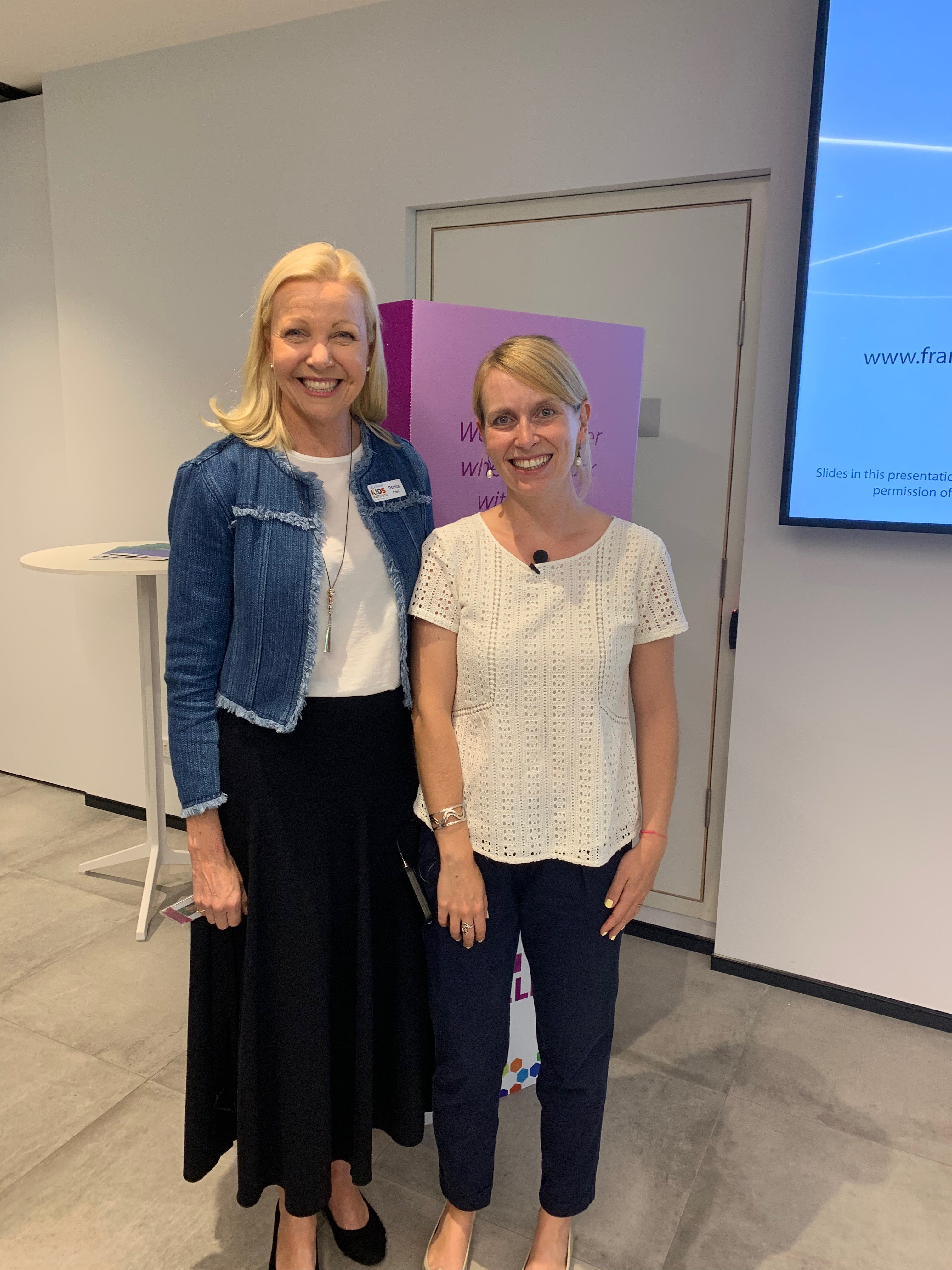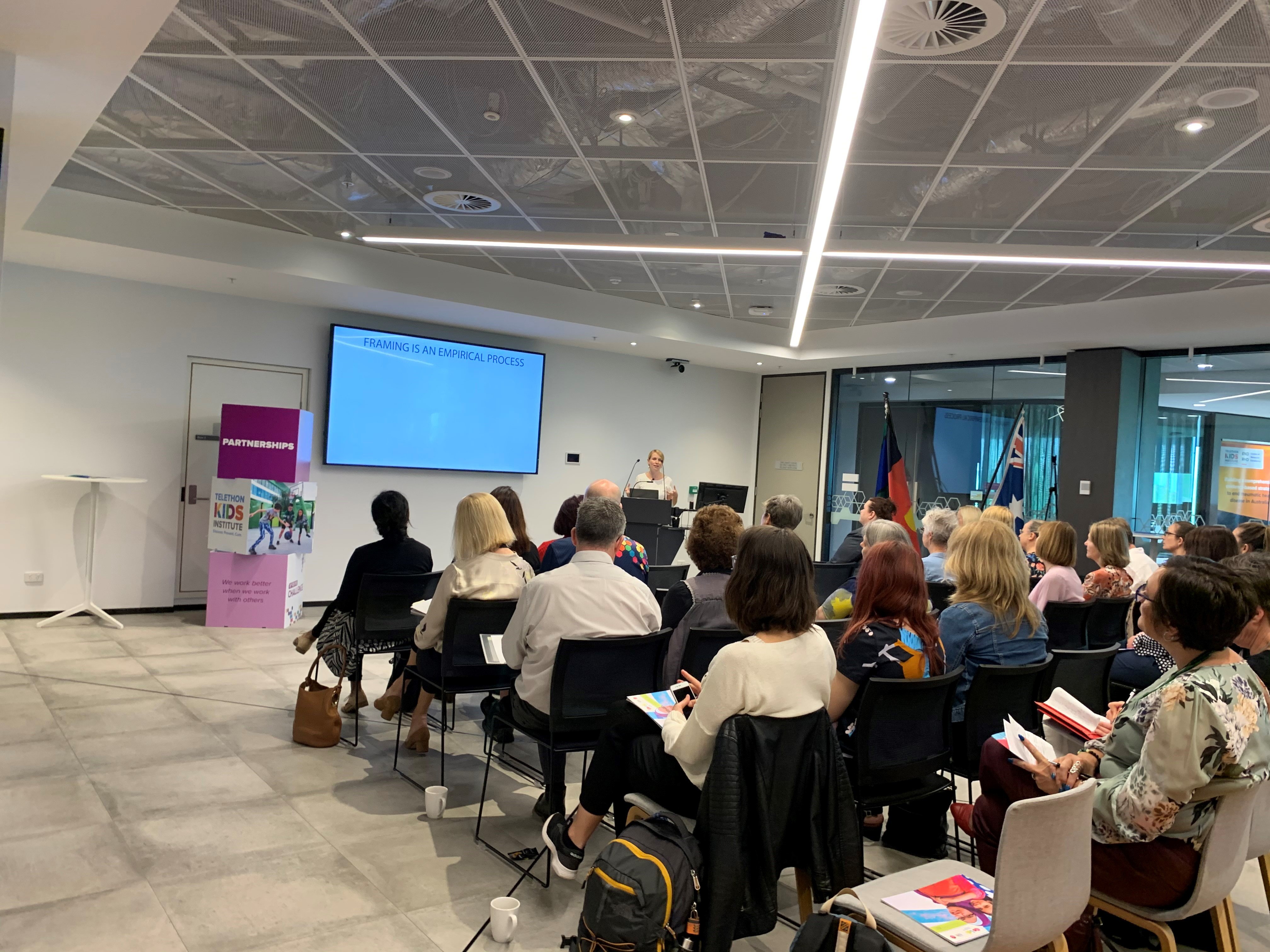
CoLab Director Professor Donna Cross with Dr Emilie L’Hote of the Frameworks Institute.
“Early is better, but it’s never too late.”
The nuanced message conveys the foundational importance of child development in the early years but avoids triggering concerns there are no opportunities to intervene at a later age.
It is an example of the unique approach to communications science that researchers at CoLab – Collaborate for Kids are applying to change public thinking about the priority required to support early child development.
Presenting at The Kids Research Institute Australia, Emilie L’Hote from the US-based FrameWorks Institute outlined cultural modelling research commissioned by CoLab that is providing valuable guidance about navigating Australian public beliefs and assumptions about early childhood development and learning in Australia.
“The public has multiple unspoken assumptions about children’s development and the factors that shape it,” Dr L’Hote, FrameWorks manager of qualitative research said. “Some can interfere with the interpretation of messages. And some can be leveraged to build support for the changes we want to see happen.”
FrameWorks cultural modelling, involving interviews with a cross-section of the Australian population uncovered shared assumptions and implicit ways of thinking that presented challenges and opportunities to communicate about parenting. Responding to this, messages and metaphors that focused on what children need for early development, rather than on ‘effective parenting’ were developed.
“Making informed choices about how information is presented and what is emphasised can really change the conversation and influence understanding – you can make real changes in the world,” Dr L’Hote said.
CoLab director Professor Donna Cross said greater public awareness and support for the early years was fundamental to changing outcomes for the one in five children who started school developmentally vulnerable.
“For better social, emotional and learning outcomes, we know we need to raise awareness of the latest child development science and support for parenting in the early years in order to influence the required changes at a government policy and program level,” Professor Cross said.
“Doing this has unique and complex challenges to ensure we are communicating in an inclusive, empowering way that builds understanding and support and reduces the risk of disengagement – it is very nuanced.”
CoLab has partnered with FrameWorks to guide the framing of messages and creative content for its successful Bright Tomorrows Start Today campaign. For example, an evidence-based metaphor about brain architecture and the concept of ‘meaningful moments’ are used to convey that brain development in babies starts from birth and is stimulated by quality interactions and experiences with parents and carers. This responds to a common gap in understanding that development ‘just happens’ identified by the FrameWorks 2019 report Cultivating Nature: Mapping the Gaps Between Expert and Public Understandings of Early Development in Australia.

CoLab’s broader Core Story initiative, which aims to transform the way early childhood development and learning is understood, is addressing other identified gaps and leveraging overlaps between expert and public understanding identified in the FrameWorks report. For instance, the initiative seeks to:
- Address the misperceptions that early childhood development is passive, with children learning like sponges soaking up information and reinforce the existing understanding of development as a process of trial and error in which the brain plays a central role. (Child development science shows development is an active process, driven by positive, meaningful interaction with caring adults).
- Address the assumption that young children do not experience mental health issues, whereas experts explain that children can be deeply affected by mental states and stress from infancy.
- Move the public to think more expansively about responsibility for healthy development, and see that a wide range of socio-economic factors, relationships and interactions can affect development.
- Leverage and expand productive understandings of play in early childhood to build support for policies and programmes focusing on play in Australia.
FrameWorks is continuing its work with CoLab to test the effectiveness — on a national level — of the frames and metaphors being developed to address these challenges in public understanding, including about play and mental health. This includes large-scale testing of changes in public attitudes following exposure to alternative information and perspectives.
The ongoing work will culminate with final recommendations and a toolkit to support the communication practices of organisations in Australia, to be released in 2020.
